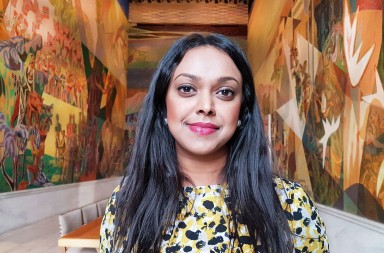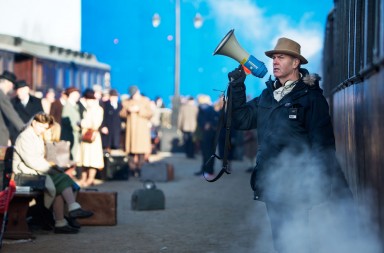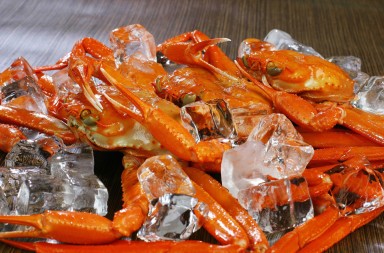Born in a small community in Kerala in the South of India, Anita Pratap became one of the most influential media professionals in her country. She talks about her years in journalism and her present life in Norway.
WHAT’S HOT: Espresso House, a cozy coffee shop located in Skøyen. Have your coffee with style (pictures below).
Anita Pratap was born, brought up, educated and worked as a journalist in India. She came from a small Catholic community in Kerala at the Southern tip of India that traces its ancestry to 345 AD. Her grandfather was a “Renaissance” man—professor (he wrote India’s first physics textbook in English), philanthropist (gave land to landless people), educator (started the first women’s college in his community), legislator (quit politics after one foray). Anita’s father was the first person in the community to get an MBA from the United States. So from childhood her outlook was very broad and truly international. Anita’s father worked all his life in Tata Steel, India’s biggest steel company. The family moved around a lot within India—Anita Pratap went to 7 schools in 11 years. India is a very heterogeneous country. It was like moving within different countries in Europe. Each state in India has its own language, its unique and distinct culture, history, cuisine. And she learnt to adapt. As Darwin says, it is not the strong who survive, but those who adapt. And as Buddha said 2,500 years ago, change is the only constant in life.
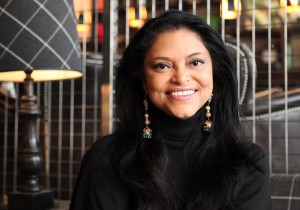
Anita Pratap at Espresso House, a cozy coffee shop located in Skøyen.
Anita Pratap wanted to be a doctor. She was so good in Biology that she used to teach her class when the teacher was absent. But for the crucial school final exam, Anita messed up and got very low marks. But, strangely, she got 95% in English Language and 95% in English Literature. This was rare because her papers were sent to Cambridge in England for evaluation. Anita had zero interest in Literature and felt betrayed by Biology. She didn’t have much choice, and did graduate studies in English Honours.
“I felt I didn’t seek my destiny, my destiny sought me. I didn’t know at 16 that I was meant to be a journalist. I have never looked back, nor ever regretted that decision made out of anger, pique, sadness and compulsion.”
A woman journalist in the male-dominated world
When she started, it was unheard of for women journalists in Asia to report politics or war. But Anita’s father had brought her up with the firm belief that “the impossible just takes a little longer”. At first, her editor and male colleagues were aghast when she said she wanted to report riots, wars and elections. Her persistence wore down resistance. Anita Pratap became a journalist when she was 20 years old and was covering wars by 24. Until she, and a few other women reporters came on the scene, only men covered wars in South Asia—also because it was very dangerous to go to these places. Men and women often see the same situation from different angles. One is not better or superior than the other. The point is that they needed both perspectives; rather, all possible perspectives:
“So when it came to reporting war, male reporters in India focused on body counts, military hardware and geopolitics. I did all that, but I also humanized the conflicts, highlighting the suffering, the death, destruction and psychological devastation.”
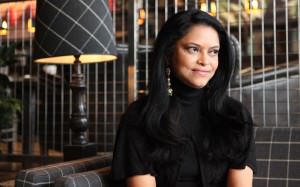
The scariest moments while working as a war journalist
“There were so many. Sometimes death stares you in the face, up close and front. Like looking into the barrel of guns aimed at you by gunmen who want to shoot you dead in order to steal your rented car in a war zone. I need both my life and my car—to report the story. I handled this by saying firmly and fearlessly that I would take them to where they wanted to go, but I would not surrender the car. A mixture of authority and reasonableness. In Afghanistan, danger was omnipresent on the front lines, but not so personal. It was in the form of artillery fire, aerial strafing, mortar shelling. I have missed grenades and tank fire by seconds.”
International recognition
Anita Pratap, at the age of 24, was the first and the only one who interviewed the leader of Tamil Tigers, Velupillai Prabhakaran (back in 1983). She was immediately recognised on an international level: “My reports on the anti-Tamil riots in Sri Lanka in 1983 internationalized the ethnic crisis raging in that beautiful tropical paradise. Mine were eye-witness accounts and I had stealthily taken photographs of the carnage. These reports created an uproar in the Indian parliament. India intervened in Sri Lanka to protect the Tamils. That intervention proved disastrous, but that is another story. My research and reporting convinced me that Prabhakaran, who was the most committed and reclusive guerrilla leader of the Tamils, would play a crucial role in this conflict. It took me months of persistence to get that interview. I have not met another human being even remotely like him. He was one of a kind—soft spoken and sincere, totally dedicated to his cause to create a free homeland for the Tamils. But he was also fierce, deadly and utterly uncompromising. And it is perhaps this last quality that ended in his defeat and death in 2009. Compromise has very bad connotations, as if you are sacrificing your principles. Maybe “adapt” is a better word. Nothing in life goes entirely the way you want—whether it is an armed struggle, politics, business, career, marriage, children or health. It’s important to learn to adapt. There is no such thing as perfect or 100% success. Victory comes laced with poisons. Success with side-effects. History is full of unintended consequences. In a storm, an oak tree falls, the supple cypress, while remaining rooted, bends and sways with the wind. And survives. Neither Prabhakaran, nor the powerful movement he created, survived.”
Working for CNN
“It was exciting, powerful, non-stop, but I regretted that I had no privacy. It might seem flattering to be recognized wherever you go, but it can be intrusive and annoying. My quiet, anonymous moments are very precious to me. But the best part was that as a journalist with deep roots, I had built up a network of the best contacts in India.”
“I knew Prime Minister Vajpayee had resigned within 30 seconds of it happening, and within another 30 seconds I could convey this information to the whole world thanks to CNN’s technology.”
“Prime Ministers customarily give their first interview to national television. But both Indian Prime Minister Deve Gowda and Pakistan’s Prime Minister Nawaz Sharif gave their first interviews in office to me. But the biggest kick I got was when the CIA admitted they had learnt of India exploding nuclear bombs in 1997 from me on CNN.”
Living in Norway
“Love and a second marriage brought me to Norway and Norway to me. My husband Arne was Norway’s Ambassador to India when I was with CNN. And that’s how it all began. It’s been a fantastic and hugely rewarding journey, living in Vienna, Saudi Arabia, Japan and now in Norway. I like Norway very very much. The fondness comes from respect. Norway is the closest to an ideal nation. Right now, Norwegians are the luckiest people alive on earth. It wasn’t like that a century ago. Norway’s success is all about creating strong, independent public institutions and managing resources responsibly. There is much for the world to learn from the Norwegian path to prosperity. And Norwegians take up all the right causes in the world. The values that I share most with the Norwegians are ethics, dislike for pomp and pomposity and love of nature.
Anita Pratap: “I love living in Oslo. You have both the fjord and the mountains. Bird song and berries in the garden. Dramatic change of seasons. Its absolutely wonderful that you can take the trikk (a tram) to Frognerseteren and then hike in Nordmarka for 6 hours. This is my spiritual dose.”
“It recharges my soul. Days of golden sunshine and blue skies in spring, summer and autumn are spectacular, but winter a bit too long. Norwegians are straight forward, law abiding, polite, modest and almost shy, until of course they’ve had a few glasses of wine. Oslo is multicultural, compact, clean, organized. My husband and I don’t keep a car to reduce our carbon footprint. It is so convenient to take the metro and buses. They are punctual and regular”, she continues.
Anita Pratap travels regularly to speak at conferences—on war, politics, women’s issues, economic growth. She has a plan to create a small journalism coaching centre in her ancestral town in Kerala down the line. She also does communication advisory work in Oslo and is on the Board of a couple of organisations. Anita writes magazine columns every fortnight. “In fact, writing is my first love. Writing brings mental discipline and clarity, forces order in the chaos of thoughts and facts swirling in one’s head. We all feel the need to express ourselves creatively—be it through art, photography, music—or through numbers, excel sheets, negotiating, planning or executing projects. It’s all about manifesting one’s intrinsic value, one’s worth as a human being.”
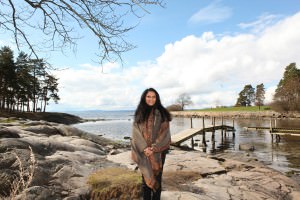
Photos: Dina Johnsen
WHAT’S HOT: Espresso House, a cozy coffee shop located in Skøyen. Have your coffee with style.
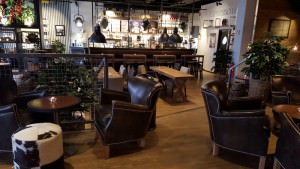

#cafes, #coffee, #coffeeshops, #cafe
